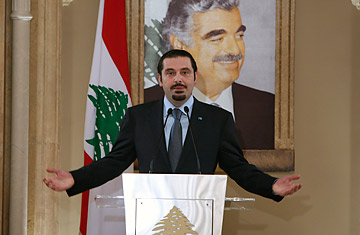
Lebanon's caretaker Prime Minister Saad Hariri speaks at a news conference in Beirut on Jan. 20, 2011
A knife-edge vote in the Lebanese parliament Monday to nominate a new Prime Minister could see the militant Shi'ite Hizballah movement and its political allies forming the next government in Beirut. The emergence of a government led by allies of Iran and Syria would almost certainly set Lebanon on a collision course with the U.S. and its key allies, particularly over the fate of a U.N.-sponsored tribunal investigating the 2005 assassination of Rafiq Hariri, a former Lebanese Prime Minister. Hizballah, in the expectation that some of its members will be indicted by the tribunal, two weeks ago withdrew from the present government led by Hariri's son, Prime Minister Saad Hariri, forcing its collapse. Hariri had defied Hizballah's demand that his government cease cooperation with the tribunal.
Hariri's pro-Western March 14 coalition warned Sunday that it would not allow "a militia to take over control of the state," adding in a statement that "Hizballah has started a coup against the state ... and has toppled the government of national unity and this coup targets Lebanon's freedom."
But Sheikh Hassan Nasrallah, leader of the Iran-backed Shi'ite movement, said Sunday evening that such assertions were "misleading," and he called for the creation of a national-unity government if the candidate of the Hizballah-led opposition bloc is nominated as Prime Minister.
"We have always said that we do not seek [power]," he said in a televised address. "We have always said that our priority is resistance [against Israel]." Since Hizballah first emerged in the war-torn Lebanon of the 1980s, it has slowly moved deeper into Lebanese political life. But each step — entering parliament in 1992 and joining a government for the first time in 2005 — was taken only when Hizballah felt that changing circumstances threatened its formidable military wing. Hizballah denies involvement in Hariri's truck-bomb assassination and insists that the tribunal is politically tainted. Although it is unlikely any indicted Hizballah member would ever stand trial in the Netherlands, where the tribunal is based, even the accusation that Hizballah played a role in killing Lebanon's top Sunni politician would worsen Sunni-Shi'ite relations and damage its credibility across the Arab world as a paragon of anti-Israel resistance.
In his address, Nasrallah admitted that the previous government was brought down because of Hariri's refusal to disavow the tribunal. "What has happened and is still happening is a political assassination of the resistance," the Hizballah chief said, referring to the tribunal's indictments, for which no date has been set, although they are expected shortly.
Hariri remains in charge of a caretaker government, and the March 14 coalition has renominated him for Prime Minister. His rival for the job of Premier — which Lebanon's political system gives to a Sunni — remains unconfirmed, but is likely to be one of three MPs from the northern city of Tripoli. To win the premiership, a nominee must gain a simple majority of 65 votes in parliament. Presently, March 14 holds 60 seats to the opposition's 57. The balance of 11 MPs belongs to a parliamentary bloc headed by Walid Jumblatt, a veteran politician and leader of Lebanon's small Druze community. Once a staunch member of the March 14 coalition and Hizballah's bitterest critic, lately Jumblatt has distanced himself from his erstwhile allies to chart a fresh course midway between the two factions. But that newfound neutrality last week placed him in the uncomfortable role of kingmaker.
Initially, Jumblatt had appeared to favor Hariri's nomination, telling a local newspaper that the decision to collapse the government was "a mistake." He intimated that Hariri, as the paramount leader of the Sunni community, was the only realistic choice for Prime Minister. By Friday, however, Jumblatt had changed his view, mindful perhaps that Lebanon is teetering dangerously close to the edge of sectarian violence — the opposition insists it will not accept Hariri in the job.
With frequent deep sighs and an expression of utter gloom on his lined face, Jumblatt told reporters that the country had reached a "dangerous crossroads" and that he would bring his parliamentary vote "alongside Syria and the resistance," referring to Hizballah.
Still, it is not a done deal for Hizballah. Not all of the 11 legislators in Jumblatt's bloc, which includes one Sunni and five Christians, will vote for the opposition's nominee. Analysts and Lebanese newspapers were furiously speculating over the weekend on which way various politicians would vote, and whether some Sunni MPs from Tripoli allied to Hariri would switch sides or abstain.
Even once the identity of the next Prime Minister is resolved, there is no guarantee that a government will quickly emerge.
If the opposition candidate wins the nomination, he could form a one-sided government of Hizballah-backed ministers, leaving Hariri and his March 14 allies on the opposition benches.
One of the first acts of a Hizballah-dominated government would be to end all cooperation with the tribunal by withdrawing the Lebanese judges and halting its share of the funding. Such a move would likely result in the U.N. Security Council amending the tribunal's mandate, allowing it to continue its judicial path uninterrupted. It would also risk turning Lebanon into a pariah state with international sympathy firmly behind the new Hariri-led opposition.
But if Hariri is renominated, a prolonged stalemate would probably ensue, raising the risk of sectarian violence. Neither side, then, has good options for pressing its case. The Lebanese have grown wearily accustomed to political crises in recent years, but rarely have they looked so intractable as this present quandary.
